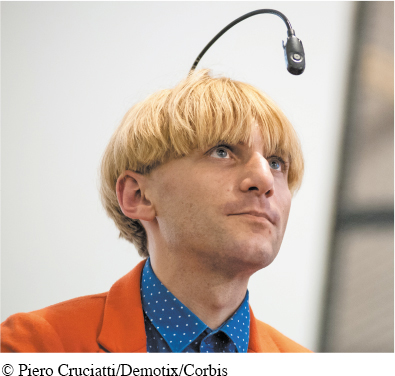10.18
Transhumanism
Francis Fukuyama

Francis Fukuyama (b. 1952) is an American professor, writer, and political scientist. He has taught at some of the most prestigious institutions of higher education in the United States, including George Mason, Johns Hopkins, and Stanford. This article, published in 2004, was written in response to a question posed by the editors in Foreign Affairs magazine: “What idea, if embraced, would pose the greatest threat to the welfare of humanity?” Fukuyama’s answer is the transhumanism movement, which embraces the idea of a coming merger between humans and robots.
For the last several decades, a strange liberation movement has grown within the developed world. Its crusaders aim much higher than civil rights campaigners, feminists, or gay-
It is tempting to dismiss transhumanists as some sort of odd cult, nothing more than science fiction taken too seriously: Witness their over-
But is the fundamental tenet of transhumanism — that we will someday use biotechnology to make ourselves stronger, smarter, less prone to violence, and longer-
Although the rapid advances in biotechnology often leave us vaguely uncomfortable, the intellectual or moral threat they represent is not always easy to identify. The human race, after all, is a pretty sorry mess, with our stubborn diseases, physical limitations, and short lives. Throw in humanity’s jealousies, violence, and constant anxieties, and the transhumanist project begins to look downright reasonable. If it were technologically possible, why wouldn’t we want to transcend our current species? The seeming reasonableness of the project, particularly when considered in small increments, is part of its danger. Society is unlikely to fall suddenly under the spell of the transhumanist worldview. But it is very possible that we will nibble at biotechnology’s tempting offerings without realizing that they come at a frightful moral cost.
seeing connections
One of Francis Fukuyama’s arguments against transhumanism is the lack of equality that might occur between “enhanced creatures” and unmodified humans because they are missing a “human essence.”
Read the following response to Fukuyama by noted transhumanist Nick Bostrom and explain the differences in their opinions:
The claim that only individuals who possess the human essence could have intrinsic value is mistaken. Only the most callous would deny that the welfare of some non-
Moral progress in the last two millennia has consisted largely in our gradually learning to overcome our tendency to make moral discriminations on such fundamentally irrelevant grounds. We should bear this hard-
5 The first victim of transhumanism might be equality. The U.S. Declaration of Independence says that “all men are created equal,” and the most serious political fights in the history of the United States have been over who qualifies as fully human. Women and blacks did not make the cut in 1776 when Thomas Jefferson penned the declaration. Slowly and painfully, advanced societies have realized that simply being human entitles a person to political and legal equality. In effect, we have drawn a red line around the human being and said that it is sacrosanct.
Underlying this idea of the equality of rights is the belief that we all possess a human essence that dwarfs manifest differences in skin color, beauty, and even intelligence. This essence, and the view that individuals therefore have inherent value, is at the heart of political liberalism. But modifying that essence is the core of the transhumanist project. If we start transforming ourselves into something superior, what rights will these enhanced creatures claim, and what rights will they possess when compared to those left behind? If some move ahead, can anyone afford not to follow? These questions are troubling enough within rich, developed societies. Add in the implications for citizens of the world’s poorest countries — for whom bio-


This is Neil Harbisson, the color-
Transhumanism’s advocates think they understand what constitutes a good human being, and they are happy to leave behind the limited, mortal, natural beings they see around them in favor of something better. But do they really comprehend ultimate human goods? For all our obvious faults, we humans are miraculously complex products of a long evolutionary process — products whose whole is much more than the sum of our parts. Our good characteristics are intimately connected to our bad ones: If we weren’t violent and aggressive, we wouldn’t be able to defend ourselves; if we didn’t have feelings of exclusivity, we wouldn’t be loyal to those close to us; if we never felt jealousy, we would also never feel love. Even our mortality plays a critical function in allowing our species as a whole to survive and adapt (and transhumanists are just about the last group I’d like to see live forever). Modifying any one of our key characteristics inevitably entails modifying a complex, interlinked package of traits, and we will never be able to anticipate the ultimate outcome.
Nobody knows what technological possibilities will emerge for human self-
Understanding and Interpreting
How does Francis Fukuyama define “transhumanism” in paragraphs 1–
3? What is the “frightful moral cost” (par. 4) of transhumanism, according to Fukuyama?
Summarize what Fukuyama means by a “human essence” (par. 6) and explain how this concept runs counter to transhumanism.
What is the distinction that Fukuyama makes between how he and the transhumanists would define a “good human” (par. 7)? What evidence does he include to support his view that we should not modify humanity?
In the last paragraph, Fukuyama calls for “humility concerning our human nature.” Explain what he means by this.
Analyzing Language, Style, and Structure
Skim back through the article, and identify specific words and phrases that Fukuyama uses to describe the proponents of transhumanism. How do his word choices reveal his tone?
In paragraphs 1 and 2, Fukuyama creates a sense of transhumanists as a “cult,” and in paragraphs 3 and 4 he describes them as seemingly “downright reasonable”; he then goes on to raise his objections. How do his structural choices help him to make and support his argument?
How does Fukuyama use the quote from the U.S. Declaration of Independence in his argument (par. 5)? What purpose does this serve?
Reread the following sentence from paragraph 6 and explain how Fukuyama’s word choice and use of rhetorical questions is either effective or ineffective in making his point: “If we start transforming ourselves into something superior, what rights will these enhanced creatures claim, and what rights will they possess when compared to those left behind?”
Reread the final sentence of Fukuyama’s article, and change the words in bold to reflect a slightly less hostile tone toward the transhumanist movement: “[W]e may unwittingly invite the transhumanists to deface humanity with their genetic bulldozers and psychotropic shopping malls.” What new tone is created through your word choice?
Connecting, Arguing, and Extending
Fukuyama says that most people are unlikely to “fall suddenly under the spell of the transhumanist worldview,” but may “nibble at biotechnology’s tempting offerings” (par. 4). What do you think are some of these tempting offerings, and would you choose them for yourself? Why or why not?
Write an argument in which you agree or disagree with the claim that Fukuyama makes that “[o]ur good characteristics are intimately connected to our bad ones: If we weren’t violent and aggressive, we wouldn’t be able to defend ourselves; if we didn’t have feelings of exclusivity, we wouldn’t be loyal to those close to us; if we never felt jealousy, we would also never feel love” (par. 7).